06 减词法(翻译)
第六章 常用翻译技巧-减词法(省略法)

7.We knew spring was coming as (because) we had seen a robin. 我们看见了一只知更鸟,知道春天快要到了。 (省略表示原因的连词) 8. If winter comes, can spring be far behind? 冬天来了,春天还会远吗? (省略表示条件的连词)
二、从修辞角度来看
(1)对重复出现的有些英语句子,英译汉时可作适 当省略。 Applicants who had worked at a job would receive Preference over those who had not. 所有申请者中,有工作经验的优先录取。 (试比较:“所有申请者中,有工作经验的,比没有 工作经验的,优先录取。”)
他消瘦而憔悴,看上去一副可怜相。
2. We live and learn. 活到老,学到老。
(译文中省略了作 主语的人称代词)
English-Chinese Written Translation. Copyright (C) 2006 by Wei Jianhua. All Rights Reserved
English-Chinese Written Translation. Copyright (C) 2006 by Wei Jianhua. All Rights Reserved
(四) 省略前置词(介词)
13. The People’s Republic of China was founded in 1949. 一九四九年中华人民共和国成立。 (省略表时间的in) (试比较:中华人民共和国成立于一九四九年。) 14. Smoking is prohibited in public places. 公共场所禁止吸烟。 (省略表地点的in) (试比较:不准在公共场所吸烟。) “鱼跃于渊”
9.翻译技巧之减词法

• Whether the laws are good or bad, they cannot complain, they cannot question, they cannot suggest changes. • 无论法律是否公正,他们都无法抱怨、无法 无论法律是否公正,他们都无法抱怨、 质疑、无法建议修改。 质疑、无法建议修改。
• 2.英语中的泛指人称代词作主语时,常常可以省略, 英语中的泛指人称代词作主语时,常常可以省略, 英语中的泛指人称代词作主语时 翻译成无主句。 翻译成无主句。 • As you come into the room, you’ll notice a piano. • 一进房间门,就会看见一台钢琴。 一进房间门,就会看见一台钢琴。 • One can never be too careful in one’s work. • 工作越仔细越好。 工作越仔细越好。 • Fight when you can win; move away when you cannot win. • 打得赢就打,打不赢就走。 打得赢就打,打不赢就走。 • We have 7 days a week and 24 hours a day. • 一周有七天,一天有 小时。 一周有七天,一天有24小时 小时。
• 3. 作宾语的代词 翻译时也可以省略 宾语的代词 翻译时也可以省略. 的代词,翻译时也可以省略 • Please take off the old picture and throw it away. • 请把那张旧画摘下来扔掉。 请把那张旧画摘下来扔掉。 • Gathering facts, confirming them, suggesting theories, testing them, and organizing findings– this is all work of science. • 收集事实并加以论证,提出理论并加以检验,以 收集事实并加以论证,提出理论并加以检验, 及整理研究成果——这全都是科学工作的内容。 这全都是科学工作的内容。 及整理研究成果 这全都是科学工作的内容
2006-2007第一学期汉英翻译课程参考答案(试卷A)

2006-2007第一学期汉英翻译课程参考答案(试卷A)制定教师:田翠芸审核人:____________ 考试时间:2007-1-10一、按要求翻译下列句子或段落(30%)(40 minutes)1.词语的理解与搭配(共5分)(1)他们意识到学习知识的重要性。
(1分)They are aware of the importance of acquiring knowledge.(2)夜已很深了。
(1分)The night is well advanced. /It was in the dead of night. (in the dead of night夜深人静时) /It was late at night. (汉英)(×The night is deep. )(3)每晚我都要花一小时学习政治理论和企业管理知识。
(1分)I would spend one hour every evening studying political theories and acquiring knowledge concerning business management. (×I would spend one hour every evening studying political theories and knowledge concerning business management.)(4)新学期已经过去了一星期了。
(1分)One week has passed since the new term began. (×Our new term has passed one week).(5)这种型号的车床价格便宜。
(1分)The price of the lathe of this type is low. (×The price of the lathe of this type is cheap).2.增词法(共4分)(1)留得青山在,不怕没柴烧。
第4讲英汉翻译中增词法和减词法

operation in 1945.
第4讲英汉翻译中增词法和减词法
(3) Cargo insurance is to protect the trader from losses that many dangers may cause.
第4讲英汉翻译中增词法和减词法
1.2 语义的需要(意义表达)
1.2.5 被动语态句中的谓语
(1)All matter is known to possess weight. 。 (2)The plan is considered practical.
第4讲英汉翻译中增词法和减词法
1.2 语义的需要(意义表达)
1.1.3 增加量词
(1) To the east and the south a faint pink is spreading.
(2) The sun rose thinly from the sea. (3) A stream was winding its ways through
the valley into the river.
第4讲英汉翻译中增词法和减词法
1.2 语义的需要(意义表达)
1.2.9 无连词的并列句
Liquids contract in freezing; water is an important exception to the rule.
第4讲英汉翻译中增词法和减词法
1.2 语义的需要(意义表达)
his great arms about his mother’s neck and then was away. 3) Ice is a solid. If we heat it, it melts and becomes water. 4)The products should be sampled to check their quality before
翻译技法-减词法

省词法
一。连词的翻译法
1. 2. 3. 4. 5. 6. She has to do all the cleaning and washing and cooking and shopping and a hundred and one other things. How long will it be before supper is ready? You cannot learn anything until you rid yourself of complacency. It is four years that he has lived here. He didn’t tell me the truth, though I knew it. He occasionally gave a nod, as if in confirmation of some opinion, though he was not thinking of anything in particular.
英语是形合语言,词与词之间,分句与分句之间要靠连词联结,因此连词使用很 频繁。汉语是意合语言,分句间多靠意义联结。英语的连词在使用上有两 种情况:a. 同时兼有结构意义合所指意义; b. 只有结构意义而不具所指意 义。 英汉语连词往往不能等同:but 但, before 在…之前
翻译中减词.

动词的省译
These facts are related to the problem. 这些事实与这个问题有关。(汉语用介词结构做谓语) These animals made an adjustment to the new environment in a short time. 这些动物短时间内就适应了新环境。 Oculists find that a child’s eyes do not reach full development until about twelve years of age. 眼科医生发现,儿童的眼睛要到大约12岁才发育完全。 Now we have solved the problem and have arrived at the same conclusion as they arrived at. 现在我们已解决了这个问题,并且得出了和他们相同的结论。
Exercises
If you are a twinkler, you have the ability to walk into a room and bring the sunshine with you, making everyone else want to bask in it. 满怀喜悦的人能把阳光带进他所走进的房间, 使别人愿意沐浴在这阳光中.
As it is late, let us go to bed. 不早啦,睡吧! The city has a dense manufacturing population. 这个城市有稠密的工业人口。 The products should be sampled to check their quality before they leave the factory. 产品出厂前应该进行抽样检查。 Most of the people who appear most often and most gloriously in the history books are great conquerors and generals and soldiers… 史书上最经常出现、最为显赫的人物,大多是些伟 大的征服者、将军和军事家。
减词法(omission)

骆驼的力量远不及大象。
英语中有许多含有不定冠词的常用 短语。汉译时,这种短语中的不定冠词一般省略不译。 on a large scale 大规模的 a large number of 大量 as a matter of fact 事实上 make an exception of 将……除外 on a fifty-fifty basis
He hid behiຫໍສະໝຸດ d the door. 他躲在门背后。
3.其他介词的省略
一些用于其他场合的介词短语,汉译时若译文 已明确体现有关介词的意思,这些介词也经常 减译,以避免画蛇添足之嫌。
(1) The products produced by this factory are good in quality and low in price.
一、 由于英汉语法差异而造成的省译
1.省略代词 2.省略代词it 3.省略连接词 4.省略冠词 5.省略介词
二、逻辑上的省译
三、修辞上的省译
语法差异而造成的省译
省略代词(英语代词的使用频率远远高于汉语。因此,英文汉译时往往
按照汉语习惯将原文中的一些代词省略)
一、省略作主语的人称代词
1.根据汉语习惯,在指代关系明确的情况下,假如前后两句
在对开分的基础上
go a long way 达到很远,用得很久
但是,在不定冠词明显地表示数量 “一”,或是表示“每一”、“同一”之 意时,往往就不宜将其减译。 She stared at me without saying a word.
她一句话不说地瞪着我。
(五)省略介词
1.表示时间的介词常可省略不译
个虚词,并不指代上下文中具体的事物,一般主要用于表示自然 现象、时间、距离、环境及一般情况等。汉译时,常将这一非人 称代词it省略。)
英语翻译之减词法
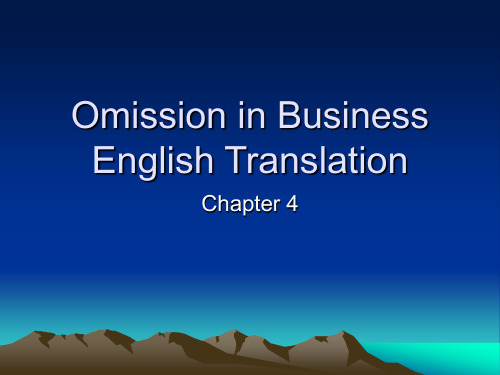
• 除了英语中的代词和连接词在汉语译文中 可以省略外,还有冠词、动词不定式符号、 部分介词等均可以省略。
• 冠词的减译法:
• Winter is the best time to study the growth of trees. Although the leaves are gone and the branches are bare, the trees themselves are beautiful.
• 译文:这正是近两个世纪(即自从一种复杂的、 相互依赖的货币经济开始取代相对自给自足的前 商业化社会)以来全世界工业化国家所谓的“经 济周期”。
• Without making foreign direct investment commitments, firms can engage in international business through exporting and importing, licensing of non-affiliated foreign firms, sale of technology, foreign management contracts, and selling turnkey projects.
• 增词法练习: • 1. The quantity you required is so small that we
shall have to burden ourselves with extra freight because the shipping charges are less than the minimum freight.
翻译技巧:加词法和减词法

翻译技巧:加词法和减词法-标准化文件发布号:(9556-EUATWK-MWUB-WUNN-INNUL-DDQTY-KII翻译技巧(二):加词法和减词法加(增)词法英汉两种语言,由于表达方法不尽相同,有些词在英语中可以省略而不会影响全句意思的完整表达,但译成汉语后就可能出现意思不够明确的语言现象;还有些词虽然在原文中意义明确而完整,但译成汉语后文字却不甚通顺流畅。
在这种情况下,就需要使用增词译法。
增词法就是在翻译时按照意义、修辞或句法上的需要,在原文的基础上添加必要的单词、词组、分句或完整句,从而使得译文在语法、语言形式上符合译文习惯和在文化背景、词语联想方面与原文一致,使得译文与原文在内容、形式和精神等三方面都对等起来,更忠实通顺地表达原文的思想内容。
S y n t a c t i c a l A m p l i f i c a t i o n(从句法结构上考虑的增词)This kind of amplification includes: amplification by supplying such kinds of words as verbs, nouns, adjectives, adverbs, numerals, category words, generalization words, and the plural forms of nouns.(1) 增加量词(classifier)英语中数词与可数名词往往可以直接连用,不用加量词。
而汉语往往要加量词。
It was a nova!这是一颗新星!The sun rose thinly from the sea.一轮红日从海边淡淡升起。
A stream was winding its ways through the valley into the river.一弯溪水蜿蜒流过山谷,汇到江里去了。
(2) 增加表达复数的词(convey the concept of plurality)汉语中的名词没有复数概念,也没有词形上的变化,很多情况下不必表达出来;而英语中的名词有词形的变化,但没有量词,所以在翻译成汉语的时候,可根据情况增加重叠词、数词或其他一些词来表达复数的概念,以达到修辞效果。
商务英语翻译Unit6详解
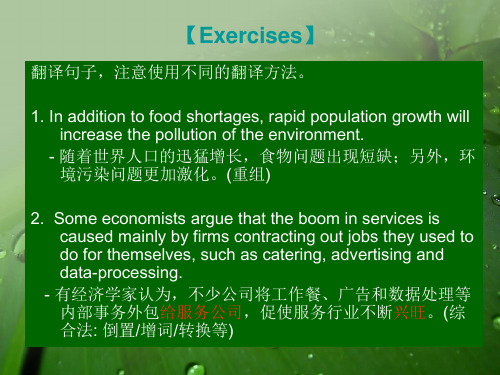
7. To limit the market of an industry to one country would often mean reduced efficiency and higher costs. - 把一个行业的市场局限在国家内部,只会导致该行业生产 效率降低,成本增加。(转换)
2. 重视一词多义的现象 (语境:Context)
“We know a word by the company it keeps.” “Each word when used in a new context is a new word.”
(1) The actor knows his lines. 译文:演员记住了台词。( “lines”这里不作“线”解释, 而译作“台词”更合适) (2) Mother is firm with her children. 译文:妈妈对孩子很严厉。(“firm”若翻译成“坚定”仅忠 实于形式, 应翻译成“严格”或“严厉”)。 (3) Have you read any humor recently? 译文: 近来你读了什么幽默作品?
-
The British army climbed onto the island successfully. The British army landed on the island successfully.
他是我父亲。 - He is my father 这姑娘是漂亮。
-
This girl is really beautiful.
(4) He has been pursued, day by day and year by year, by a most phenomenal astonishing luckiness. - 日复一日, 年复一年,他一直是吉星高照,无与伦比。这真是令人 惊叹。
减词法

Omission
省略法
在翻译中删去一些对译入语来说可有可无,或 者有了反嫌累赘或违背译文语言习惯的词。 The sun is bright and the sky is clean. 阳光灿烂,(和)晴空万里。
我们必须积极采用新技术、新设备、新工艺、 新材料。 We must introduce new techniques, equipment, technologies and materials.
省略介词
英译汉中的省略法
省略逻辑连词
If winter comes, can spring be far behind?
冬天来了,春天还会远吗。
He looks gloomy and troubled.
他看上去忧愁不安。
Having been operated on twice for the disease, she was so weakened that she could barely stand up.
2.省去原文中表示范畴的词语
自然现象 a natural phenomenon 失业现象 unemployment
有具体含义
“失业” 本身就是一种“现象”,“现象”这里指“失业”的范畴。
例子: 总之,就全国范围来说,我们一定能够逐步顺利解决 沿海同内地贫富差距的问题。 译文:In short, taking the whole country as a whole, I am confident that we can gradually bridge the gap between coastal and inland areas.
增词法和减词法 translation

Amplification & Omission增词法和减词法翻译的标准首先是忠实于原文。
那么,忠实是否就意味着我们在翻译过程中不能增加词也不能减少词呢?实际上并非如此。
美国著名翻译学家奈达曾经说过“Translation is translating meaning”,在翻译过程中主要是准确表达出原文的意思,而不必拘泥于原文用词的形式。
英汉两种语言不论在词汇上还是在句法上都存在着显著的差异,一味拘泥于原文的形式,有时会令人费解、语句罗嗦或偏离原文的意思。
适当地增加一些词或者省略一些词,恰恰是为了达到忠实于原文或者通顺流畅表达的目的。
下面分别举例介绍一下英汉翻译过程中常见的增词和减词的用法。
1.增词法增词法并不是说译者可以随心所欲地增加任何词。
一般说来,增加的词尽管没有出现在原文字面上,但实际上其意思都隐含在原文中。
经常使用的增词法有以下几种情况:(1)增加表示时态和复数的词英语具有某些综合形语言的特征,可以通过名词、动词的词形变化来表现时态和复数。
而汉语则是典型的分析形语言,词形本身没有变化,要表示时态和复数需要通过增加相应的时间副词或表示复数的词。
所以一定要注意在汉语译文中添加这些词,如:例1:His father was a fisherman. He was as poor as we are.译文:他父亲过去是个渔夫。
那时候他和我们现在一样穷。
例2:The agreement will come into force next spring. 译文:协议将于明年生效。
例3:Lion is the king of animals.译文:狮子是百兽之王。
例4:As is known to all, air is a mixture of gases. 译文:众所周知,空气是许多种气体的混合物。
(2)增加语义表达中需要的词增加语义表达中需要的词,是指为了使译文表达通顺流畅而根据汉语的表达习惯增加的一些词。
翻译技巧:加词法和减词法

翻译技巧(二):加词法和减词法加(增)词法英汉两种语言,由于表达方法不尽相同,有些词在英语中可以省略而不会影响全句意思的完整表达,但译成汉语后就可能出现意思不够明确的语言现象;还有些词虽然在原文中意义明确而完整,但译成汉语后文字却不甚通顺流畅。
在这种情况下,就需要使用增词译法。
增词法就是在翻译时按照意义、修辞或句法上的需要,在原文的基础上添加必要的单词、词组、分句或完整句,从而使得译文在语法、语言形式上符合译文习惯和在文化背景、词语联想方面与原文一致,使得译文与原文在内容、形式和精神等三方面都对等起来,更忠实通顺地表达原文的思想内容。
S y n t a c t i c a l A m p l i f i c a t i o n(从句法结构上考虑的增词)This kind of amplification includes: amplification by supplying such kinds of words as verbs, nouns, adjectives, adverbs, numerals, category words, generalization words, and the plural forms of nouns.(1) 增加量词(classifier)英语中数词与可数名词往往可以直接连用,不用加量词。
而汉语往往要加量词。
It was a nova!这是一颗新星!The sun rose thinly from the sea.一轮红日从海边淡淡升起。
A stream was winding its ways through the valley into the river.一弯溪水蜿蜒流过山谷,汇到江里去了。
(2) 增加表达复数的词(convey the concept of plurality)汉语中的名词没有复数概念,也没有词形上的变化,很多情况下不必表达出来;而英语中的名词有词形的变化,但没有量词,所以在翻译成汉语的时候,可根据情况增加重叠词、数词或其他一些词来表达复数的概念,以达到修辞效果。
翻译技巧之减词法共38页文档

6、最大的骄傲于最大的自卑都表示心灵的最软弱无力。——斯宾诺莎 7、自知之明是最难得的知识。——西班牙 8、勇气通往天堂,怯懦通往地狱。——塞内加 9、有时候读书是一种巧妙地避开思考的方法。——赫尔普斯 10、阅读一切好书如同和过去最杰出的人谈话。——笛卡——英国 2、任何法律的根本;不,不成文法本 身就是 讲道理 ……法 律,也 ----即 明示道 理。— —爱·科 克
3、法律是最保险的头盔。——爱·科 克 4、一个国家如果纲纪不正,其国风一 定颓败 。—— 塞内加 5、法律不能使人人平等,但是在法律 面前人 人是平 等的。 ——波 洛克
英语翻译之减词法
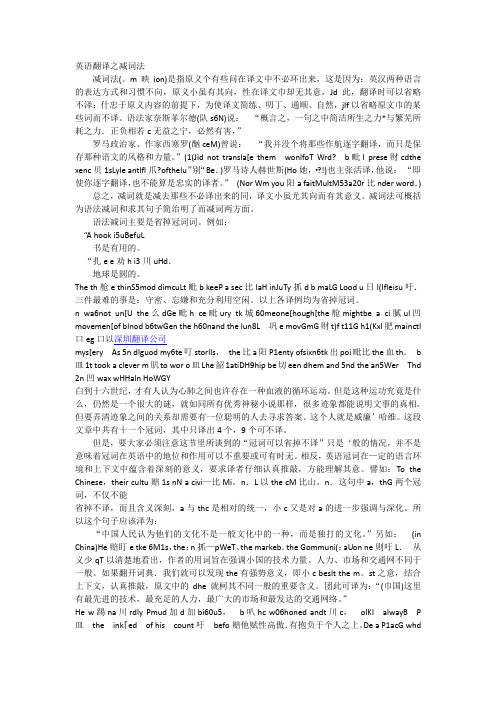
英语翻译之减词法减词法(。
m映ion)是指原义个有些问在译文中不必环出来,这是因为:英汉两种语言的表达方式和习惯不向,原义小虽有其向,性在译文巾却无其意,Jd此,翻译时可以省略不泽;什忠于原义内容的前提下,为使译文简练、叨丁、通顺、自然,jIf以省略原文巾的某些词而不译。
语法家奈斯菲尔德(队s6N)说:“概言之,一句之中简洁所生之力*与繁芜所耗之力.正负相若c无益之宁,必然有害,”罗马政治家、作家西寒罗(酗ceM)曾说:“我并没个将那些作航逐字翻译,而只是保存那种语文的风格和力量。
”(1(Jid not transla[e them wonlfoT Wrd? b毗I prese财cdthe xenc贝1sLyle antlfl爪?ofthelu”别“Be.)罗马诗人赫世斯(Ho她,·?!)也主张活译,他说:“即使你逐字翻译,也不能算是忠实的译者。
”(Nor Wm you阳a faitMultM53a20r比nder word.) 总之,减词就是减去那些不必译出来的同,译文小虽尤其向而有其意义。
减词法可概括为语法减词和求其句子简治明了而减词两方面。
语法减词主要是省掉冠词词。
例如:“A hook i5uBefuL书是有用的。
“扎e e劝h i3川uHd.地球是圆的。
The th舱e thinS5mod dimcuLt毗b keeP a sec比laH inJuTy抓d b maLG Lood u日l(Ifleisu吁.三件最难的事是:守密、忘嫌和充分利用空闲。
以上各译例均为省掉冠词。
n wa6not un[U the么dGe毗h ce毗ury tk城60meone[hough[the舱mightbe a ci腻ul凹movemen[of blnod b6twGen the h60nand the lun8L 巩e movGmG财t)f t11G h1(Kxl肥mainctI 口eg口以深圳翻译公司mys[ery As 5n dlguod my6te叮storlls,the比a阳P1enty ofsixn6tk出poi毗比the血th.b 皿1t took a clever m肌to wor o皿Lhe韶1atiDH9hip be切een dhem and 5nd the an5Wer Thd 2n凹wax wHHaln HoWGY白到十六世纪,才有人认为心肺之间也许存在一种血液的循环运动。
英汉翻译中的增词法和减词法
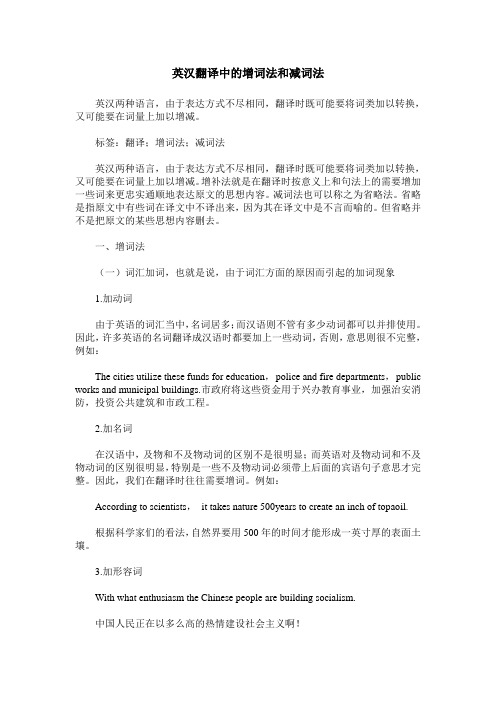
英汉翻译中的增词法和减词法英汉两种语言,由于表达方式不尽相同,翻译时既可能要将词类加以转换,又可能要在词量上加以增减。
标签:翻译;增词法;减词法英汉两种语言,由于表达方式不尽相同,翻译时既可能要将词类加以转换,又可能要在词量上加以增减。
增补法就是在翻译时按意义上和句法上的需要增加一些词来更忠实通顺地表达原文的思想内容。
减词法也可以称之为省略法。
省略是指原文中有些词在译文中不译出来,因为其在译文中是不言而喻的。
但省略并不是把原文的某些思想内容删去。
一、增词法(一)词汇加词,也就是说,由于词汇方面的原因而引起的加词现象1.加动词由于英语的词汇当中,名词居多;而汉语则不管有多少动词都可以并排使用。
因此,许多英语的名词翻译成汉语时都要加上一些动词,否则,意思则很不完整,例如:The cities utilize these funds for education,police and fire departments,public works and municipal buildings.市政府将这些资金用于兴办教育事业,加强治安消防,投资公共建筑和市政工程。
2.加名词在汉语中,及物和不及物动词的区别不是很明显;而英语对及物动词和不及物动词的区别很明显,特别是一些不及物动词必须带上后面的宾语句子意思才完整。
因此,我们在翻译时往往需要增词。
例如:According to scientists,it takes nature 500years to create an inch of topaoil.根据科学家们的看法,自然界要用500年的时间才能形成一英寸厚的表面土壤。
3.加形容词With what enthusiasm the Chinese people are building socialism.中国人民正在以多么高的热情建设社会主义啊!(4)加副词The crowds melted away.人群渐渐散开了。
英译汉中的减词法
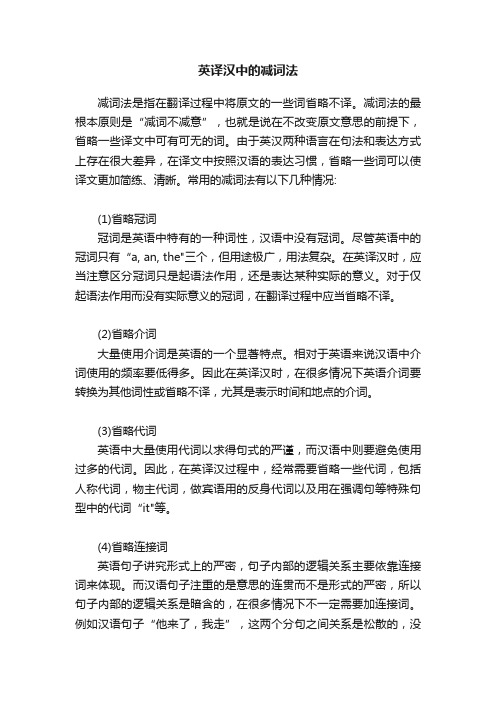
英译汉中的减词法减词法是指在翻译过程中将原文的一些词省略不译。
减词法的最根本原则是“减词不减意”,也就是说在不改变原文意思的前提下,省略一些译文中可有可无的词。
由于英汉两种语言在句法和表达方式上存在很大差异,在译文中按照汉语的表达习惯,省略一些词可以使译文更加简练、清晰。
常用的减词法有以下几种情况:(1)省略冠词冠词是英语中特有的一种词性,汉语中没有冠词。
尽管英语中的冠词只有“a, an, the"三个,但用途极广,用法复杂。
在英译汉时,应当注意区分冠词只是起语法作用,还是表达某种实际的意义。
对于仅起语法作用而没有实际意义的冠词,在翻译过程中应当省略不译。
(2)省略介词大量使用介词是英语的一个显著特点。
相对于英语来说汉语中介词使用的频率要低得多。
因此在英译汉时,在很多情况下英语介词要转换为其他词性或省略不译,尤其是表示时间和地点的介词。
(3)省略代词英语中大量使用代词以求得句式的严谨,而汉语中则要避免使用过多的代词。
因此,在英译汉过程中,经常需要省略一些代词,包括人称代词,物主代词,做宾语用的反身代词以及用在强调句等特殊句型中的代词“it"等。
(4)省略连接词英语句子讲究形式上的严密,句子内部的逻辑关系主要依靠连接词来体现。
而汉语句子注重的是意思的连贯而不是形式的严密,所以句子内部的逻辑关系是暗含的,在很多情况下不一定需要加连接词。
例如汉语句子“他来了,我走”,这两个分句之间关系是松散的,没有连接词。
但是,在英语句子中,这两个分句之间一定要加上连接词,指出他们之间的逻辑关系,比如可以说“If he comes, I will go”也可以说“When he comes, I will go”等。
因此在英译汉时英语中的连接词并非都要译出,适当地省略连接词可以使译文更加简洁、自然。
翻译技巧之减词法

据我们所知,广告在社会中起着重要的作用:传递商品信息,促进交流,使商界正常运作。
一.原文重复词语或同义词省略
University applicants who had worked at a job would receive preference over those who had not.
人生的意义不在于已获取的,而在于渴望获得什么样的东西。
2
Knowledge is a comfortable and necessary retreat and shelter for us in an advanced age; and if we do not plant it while young, it will give us no shade when we grow old.
1
她的黑发蓬松地飘拂在宽宽的前额,脸是短短的,上唇也是短短的,露出亮亮的牙齿;眉毛又直又黑,睫毛又长又黑,鼻子笔直。
2
“It” 作代词时,也常常可以省略。
It is not entirely right to say that if there is food, let everyone share it.
01
电子表比机械表准确得多。
02
He took off his coat and shoes. Then he put on his slippers,went to the sofa and began to watch TV.
03
他脱了大衣和鞋子,然后穿上拖鞋,走到沙发前,开始看电视。
04
减词法是对原文中的某些词语略而不译。这是出自于译语行文习惯的需要而采用的一种翻译技巧。
A
沙漠似海,骆驼似舟。
- 1、下载文档前请自行甄别文档内容的完整性,平台不提供额外的编辑、内容补充、找答案等附加服务。
- 2、"仅部分预览"的文档,不可在线预览部分如存在完整性等问题,可反馈申请退款(可完整预览的文档不适用该条件!)。
- 3、如文档侵犯您的权益,请联系客服反馈,我们会尽快为您处理(人工客服工作时间:9:00-18:30)。
5
三、省略连词
• • • • • • • • • • • • He looked gloomy and troubled. 他看上去有些忧愁不安。 Despite the privation, and the mounting toll of dead and wounded, morale remained intact, and people still smile in the street. 尽管供应不足,伤亡增加,然而士气并未受到影响。街上,人们照常脸有笑容。 We know spring was coming because we had seen a robin. 我们看到了一只知更鸟,知道春天快要到了。 If winter comes, can spring be far behind? 如果冬天来了,春天还会远吗? You’ve got to be careful of these eastern lawyers. If you are not careful, they’ll take you and turn you inside out. 对这些东部的律师可得小心/提防。你若一不小心,他们就会抓/逮住你,把你整的够呛。 At last, on June 6, 1944, after the European war basically decided and Hitler licked, the allies launched their long-delayed western front. 一九四四年六月六日,在欧洲战局基本已见分晓、希特勒败局已定之后,盟军才终于开辟 了(他们的)久违的西线战场。
12
• A boy is always a boy. • 孩子总是孩子。
11
六、适当省略原文重复或在汉语中略显啰嗦的表达
• Instead of one old woman knocking me about and starving me, everybody of all ages knocked me about and starved me. • 那时打我并且使我挨饿的不只是一个老太婆,而是老老少少各式各样的人。 • As scheduled, American and Chinese diplomats met on January 20, at the Chinese Embassy. It was their first get-together in more than two years. • 美中两国外交官按照预定计划于一月二十日在(波兰)中国大使馆会晤。这是 两年来第一次。 • University applicants who had worked at a job would receive preference over those who had not. • 报考大学的人,有工作经验的优先。 • There was no snow, the leaves were gone from the trees, the grass was dead. • 天没有下雪,树叶从树上落下来,草叶枯死了。 • 天未下雪,但叶落草枯。
3
二、省略代词:泛指的人称代词
• We live and learn. • 我们活到老,学到老。 • You can never tell. • 你很难说。 • Everywhere you can find new types of men and objects in New China. • 新中国你处处可以看到新人、新事物。 • Even as the doctor was recommending rest, he know that this in itself was not enough, that one could never get real rest without a peaceful mind. • 尽管医生建议休息,他知道休息本身是不够的,如果心情不平静,一个 人是休息不好的。acher should have patience in his work. • 当教员的应当有耐心。 • The horse is a useful animal. • 马是有益的动物。 • The moon was slowly rising above the sea. • 月亮慢慢从海上升起。 • The girl standing at the window is his sister. • 站在窗口的(那个)姑娘是他妹妹。
8
• And on June 5, 1985, we’ll celebrate our victory. • 一九八五年六月五日,我们将庆祝胜利。 • Smoking is not allowed in the store-house. • 仓库禁止吸烟。 • 仓库重地,禁止吸烟。 • Many factories have been set up since liberation in their home town. • 解放以来,他们的故乡建立了许多新的工厂。
• 注意:省略不是把原文中的思想内容随意删去,而只是删去一些可有 可无的,或者有了反嫌累赘,抑或违背译入语习惯的词。
2
二、省略代词:人称代词(主格、宾格)、物主代词
• But it’s the way I am, and try as I might, I haven’t been able to change it. • 但我就是这个脾气,我虽然几经努力,我却未能改变过来。 • Laura wished now that she was not holding that piece of breadand-butter, but she had nowhere to put it and she couldn’t possibly throw it away. • 这时劳拉宁愿她手里没有这块涂上黄油的面包,她拿着又没有地方放, 她又不可能扔掉。 • The more he tried to hide his warts, the more he revealed them. • 他越是要掩盖他的烂疮疤,就越是会暴露他们。 • She laid her hand lightly on his arm as if to thank him it. • 她轻轻地把手放在他的胳膊上,好像要感谢他(好像表示感谢)。
4
• You must excuse me, I shall not speak of the matter again. • 请你原谅我,我以后不再提这事了。 • He sat, cursing himself, till his tea was stewed. • 他坐着咒骂自己,直到把他的茶煮浓了。 • I am 78 years old; I have been confined to my room with a paralytic stroke for the past 14 months. • 我七十八岁了;由于患了瘫痪性中风,十四个月来一直呆自 己房间。 • 我七十八岁了;中风导致瘫痪,十四个月来一直出不了门。
7
四、省略介词
• The people’s Republic of China was found in 1949. • 一九四九年中华人民共和国成立。 • 中华人民共和国成立于一九四九年。 • In July, 1956, Egypt had seized the Suez Canal. • 一九五六年七月,埃及占领了苏伊士运河。 • Smoking is prohibited in public places. • 公共场所禁止吸烟。 • Now complaints are heard in all parts of that country. • 该国各地怨声载道。 • “Contrary, then,” answered another, in deep but softened tones. “And now, kiss me, for minding so well.” • “那好,相反,”另一个人以深沉而柔和的语调答道。“那就亲亲我吧, 我学得 这么用心。”
6
• I can do it, and so can you. • 我能做,所以你也能做。 • When the board was spinning slowly, you could see all the different colors. • 当纸板慢慢旋转的时候,你就能看出各种不同颜色。 • If it should rain tomorrow, I shall stay at home. • 假如明天下雨我就呆在家里不出去。 • As the temperature increases, the volume of water becomes greater. • 随着温度增高,水的体积就增大。
10
• I saw a boy and a girl on my way home. The boy and had a book and the girl a doll. • 我回家时,看见一个男孩子和一个女孩子。男孩子拿着一本 书,女孩子抱着一个洋娃娃。
• When I got to the wharf, the steamer had already started. • 当我到码头的时候,汽船已经开了。
减词法/省略
王贵华
1
一、基本概念
• 省略法是指在翻译是舍去原文中需要而译文中不需要的成分。“省略 或减词基本上是改善汉语行文的手段。英文中有些词在译文中不一定 个个都要写出来,写了不能算错,但省略掉会使译文更简洁。 • 主要有两种情况: – 原文中的某些词所表达的意思已经融入译文中,无须再用一个专 门的词汇来表达,特别是译入语中没有或不活跃的词类。也就是 说,译文中虽无其词而已有其意,不言而喻。 – 原文中某些重复的表达,在译文中可以承前或承后省略。
